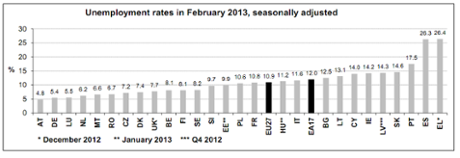 "Was jittery Thursday a foretaste of another global economic crash?
"Was jittery Thursday a foretaste of another global economic crash?
The sharp slide in share prices was either a blip in the road to recovery or a sign that the unwinding of quantitative easing will lead to disaster. Our writers argue it out" - the Telegraph on Sunday. The banking system, sovereign debt, equity markets are all FUBAR and bare no relation to the underlining fundamentals from where price discovery should come from. That is the problem and much of it has to do with ZIRP/QE, Draghi mouthing off, which although stops any immediate crash it is still just blowing bubbles and 'can kicking' where at any point to try to unwind from that position still leaves a gap between there and real growth coming back to stop the shortfall when ZIRP/QE Draghi on a buying spree taper away from their positions. Five years on from the WFC they are no nearer to fixing the problem, or the disaster of the euro. My guess is that eventually in the coming years governments will choose from the inflation poison chalice, rather than the default poison chalice, they nearly always do. Fiat money will become very devalued, and to my mind they have already set off on this path with orchestrated currency wars, and the printing presses a rolling If another big financial crash occurs I wonder what all those experts in the astrology like subject known has economics will be citing has the cause, let alone the required solutions. Not that the accountants, politicians, top business people, and goodness knows who else have demonstrated any more competence, except to ensure that the people that are made to pay for the disaster are those least responsible for it, and least able to afford to pay. Am I the only one who is coming to the conclusion that much of the human world is being run by self serving ego maniacs?
But more importantly the facts behind Thursdays ''market blip'' relates to leverage and debt. After the 2008 crash we have failed to de-leverage, the losses have been largely hidden by accounting tricks or taken over by the taxpayer. Instead of de-leveraging and re-capitalizing the banks QE and ZIRP have resulted in a massive leveraged derivative bubble now waiting to burst.
Thursdays blip might be the realization that.
1. That despite 5 years of recession endless money printing we are still seeing no real growth, outside of that provided via stimulus then it may be that these policies of QE and ZIRP are in fact failed policies, when the markets realize this investors will start to control interest rates not Bernanke and other central bankers.
2. Despite Abe's shock and awe policies Japanese rates doubled on Wednesday, Thursday. If markets suspect (and I think they do) that Japanese monetary policies are failing as indicated by rising rates, then we maybe witnessing the beginning of the end for Japan and the rest of the world! why?
3. When investors realize QE and ZIRP have failed we will see the 1.5 quadrillion dollar derivative market melt down and it wont be an ordinary unwinding. Chaos is not a word that will describe the result as counter parties evaporate and the world banking system collapses....
Funny how words change their meaning. I remember watching a Fred Astaire Ginger Rogers film on Channel 4 one Saturday afternoon called 'The Gay Divorce'. Of course the word 'Gay' has changed completely since the 1930s and it was all very comic.
In contemporary mainstream economics the word 'recovery' seems also to have undergone a transmutation. Once upon a time it meant falling unemployment, increasing investment, rising wages and prices, all based upon official statistics you could actually believe.
Today recovery means asset price bubbles, wage repression, pension repression, grinding down the poor the sick and the old, stubborn levels of unemployment/underemployment, a massive liquidity trap, counterfeit statistics from the Bureau of Labor Statistics, and the Office Of National Statistics - but hey, stock markets are booming, companies are sitting on piles of cash, share buybacks are all the rage, the financial elite is raking it in again, the tax avoidance industry has never been healthier or more ubiquitous. Yes this is some Central Bank engineered 'recovery'.
What really amazes me is the degree to which financial commentators are taken in by such blatantly crude propaganda. Which reminds me of the old saying: ‘You cannot hope to bribe or twist (thank God!) the British journalist. But, seeing what the man will do un-bribed, there's no occasion to.'Of course there are exceptions, but the majority of commentators and opinion formers seem satisfied to simply spew out the 'official' Pollyanna rubbish. The reason for this is that they actually believe it themselves.




















